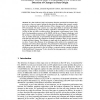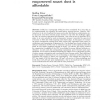75 search results - page 15 / 15 » Efficient Revocation in Group Signatures |
CRYPTO
1994
Springer
14 years 1 months ago
1994
Springer
Suppose we are given a proof of knowledge P in which a prover demonstrates that he knows a solution to a given problem instance. Suppose also that we have a secret sharing scheme S...
CCS
2008
ACM
13 years 11 months ago
2008
ACM
Multisignatures allow n signers to produce a short joint signature on a single message. Multisignatures were achieved in the plain model with a non-interactive protocol in groups ...
BMCBI
2002
13 years 9 months ago
2002
Background: The identification of species or species groups with specific oligo-nucleotides as molecular signatures is becoming increasingly popular for bacterial samples. However...
DAWAK
2003
Springer
14 years 3 months ago
2003
Springer
In a data warehouse (DW) environment, when the operational environment does not posses or does not want to inform the data about the changes that occurred, controls have to be impl...
IJSNET
2008
13 years 9 months ago
2008
: Public key cryptography (PKC) has been considered for a long time to be computationally too expensive for small battery powered devices. However, PKC turned out to be very benefi...


